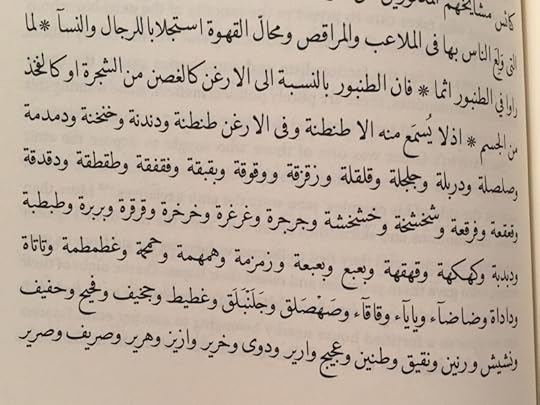What do you think?
Rate this book


368 pages, Hardcover
First published January 1, 1855
I committed myself to writing a book that would be a repository for every idea that appealed to me, relevant or irrelevant, for it seemed to me that what was irrelevant to me might be relevant to someone else, and vice versa. If you're of a mind, submit - if not, so be it: this is no time for quibbling and quarreling.
Praise be to God, Who each happy thought inspires, and to guide man to righteous acts conspires. To proceed: everything that I have set down in this book is determined by one of two concerns. The first of these is to give prominence to the oddities of the language, including its rare words.Yes please.
Under the category of oddities fall Words that are similar in meaning and words that are similar in lexical association. Here I have included the most celebrated, important, and necessary items that need to be known, and in elegantly eloquent form, for, had they been set out in the style typical of our books on language, divorced from any context, the effect would have been wearisome. I have also taken care on some occasions to present them in alphabetical order and on others to arrange them in paragraphs of rhymed prose and morphologically parallel expressions.
Rhymed prose is to the writer as a wooden leg to the walker. I must be careful therefore not to rest all my weight on it every time I go for a stroll down the highways of literary expression lest its vagaries end up cramping my style or it toss me into a pothole from which I cannot crawl. Indeed, it seems to me that the difficulties of rhymed prose are greater than those of poetry, for the requirements regarding linking and correspondence set for lines of verse are fewer than those for the periods of rhymed prose. In rhymed prose, the rhyme often leads the writer from his original path to a place he would never have wanted to reach had he not been subjected to its constraints. Here our aim is to weave our story in a way acceptable to every reader.an actual fairly frequent reference to how the author is really testing the reader's patience, or apologizing for entire chapters after the fact, even going so far as to assure the reader that the author will do better in the next volume.
I must go on at some length in this chapter, just to test the reader’s endurance. If he gets to the end of it at one go Without his teeth smoking with rage, his knees knocking together from frustration and fury, the place between his eyes knitting in disgust and shame, or his jugulars swelling in Wrath and ire, I shall devote a separate chapter to his praise and count him among those readers “Who are steadfast.”I will say, unlike Sterne, the narrative does progress here, and there is an actual autobiography buried in all the digression.
The tambour is to the organ as the branch is to the tree or the thigh to the body, for the only sound that it makes is a strumming, While the organ produces strumming and humming, mumbling and rumbling, jangling and jingling, squeaking and creaking, chirping and cheeping, burbling and barking, clicking and clacking, gnashing and crashing, chinking and clinking, gurgling and gargling, purring, cooing, and bleating, thrumming and drumming, roaring and guffawing, glugging and gabbling, la-la-ing and lullabying, horses’ neighs and the roaring of Waves, blubbing of billy goats and cricking of cradles, cries of men at war, call of merlins and raven’s caw, old women moaning and heavy doors groaning, snores and stertors, huffing and soughing, water boiling and grief-stricken bawling, frogs rib biting and ears tinky-tinkling, bulls bellowing and gaming-house reprobates roaring, reverberations and crepitations, pots gently bubbling and chilly dogs whimpering, pulleys squeaking and crickets chirruping, milk flowing, chickens crowing, and cats mewing, not to mention caw-caw and hubble-bubbleSo, as you can see, there is this lovely rhythm to the translation. Reading this I happened to look over at the source text and came across:

[...] the woman whose vulva squeaks when it’s entered, the woman with the dry little scrawny one, the woman with the emaciated one, the woman with the tiny vagina a man can’t get at, the woman who holds the man’s semen inside her womb, the woman who flashes her “thing” and her belly folds, the woman the clefts at the head of whose womb are narrow and who holds herself rigid on her side for the man, the woman whose vagina makes a sound when entered, the woman broad-buttocked as a donkey whose vulva also makes a sound, the one whose vagina makes another kind of sound, the woman who swoons during intercourse and the woman who faints during intercourse, the woman who menstruates from her anus, the woman with a wide vagina, the woman the meaty parts of whose vagina are tight, the woman whose vagina is wide open and the woman whose vagina is open wide, the woman whose vagina may be either small or capacious, the woman whose vagina and rectum have been torn so that they have become one, the broad-vagina-ed and debauched woman, the uncircumcised woman with torn vagina and rectum who is also incontinent, the women so much fucked that, like an overused she-ass, she’s developed a medical condition in her womb [...]